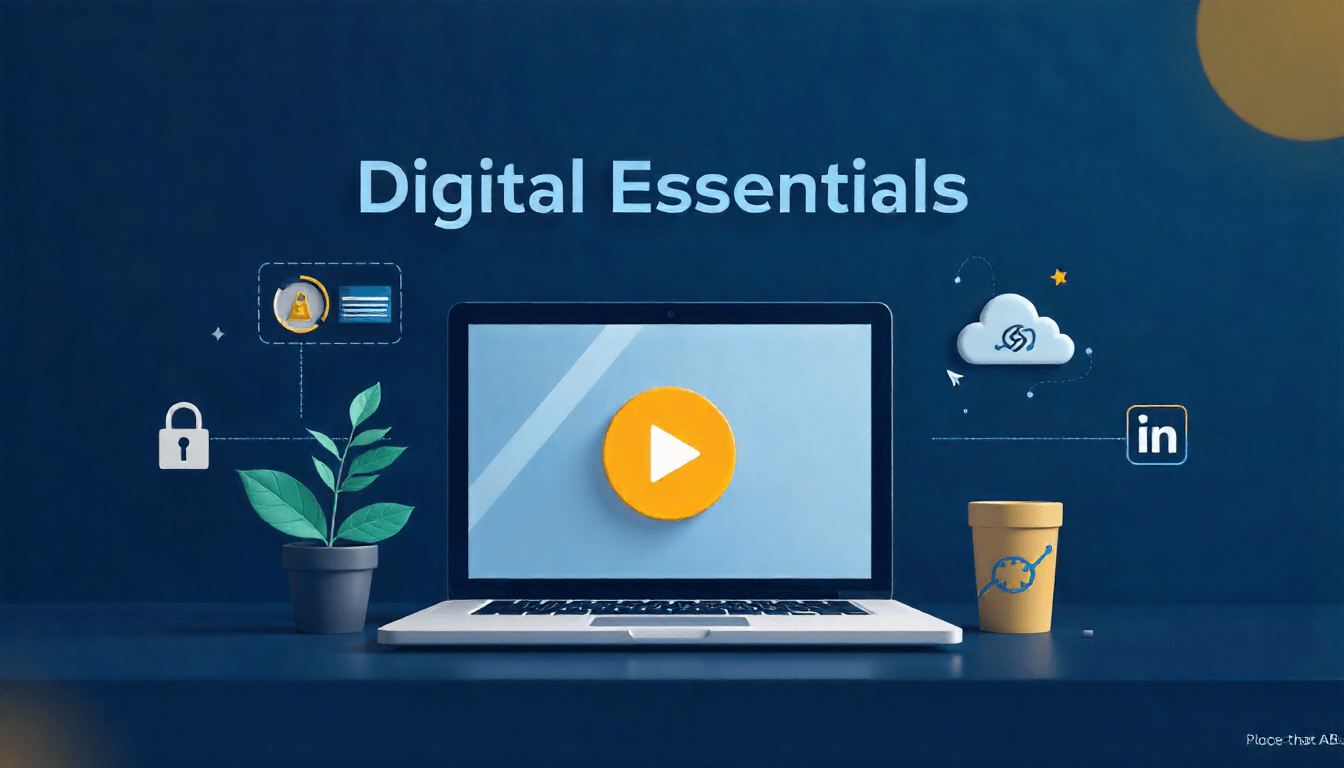
Applied Digital Skills: Thriving Skills for Life and Career in the Digital Age
- 5 Sections
- 18 Lessons
- 20h Duration
Core ICT Fundamentals
The Internet and the Online World (Navigating the Digital Landscape)
Productivity Tools & Office Applications
Cybersecurity and Online Safety
Digital Tools for Career & Creativity
Live, practical, and beginner-friendly — this 20-hour course (20 × 1-hour live sessions, twice weekly) teaches the core ICT skills everyone needs to succeed at school, at work, and online.
In this instructor-led bootcamp, you’ll learn how computers and operating systems work, how to find and evaluate information online, how to create professional documents and presentations, and how to confidently use spreadsheets, cloud collaboration tools, and essential career tools like LinkedIn and Canva. You’ll also build practical defenses against online threats with applied cybersecurity lessons and learn where to go next in data, design, and coding.
Why this course works:
- Live, hands-on lessons with real-time demos, polls, and group activities.
- Weekly cheat sheets and downloadable templates to practice between sessions.
- Practical mini-projects (CV, budget spreadsheet, presentation, Canva social post) that become portfolio pieces.
- Certificate of completion and guidance for next-step learning paths.
Schedule: Live on YouTube (Wednesdays 17:00–18:00 GMT+1 & Fridays 18:00–19:00 GMT+1). Sessions are recorded and shared with enrolled learners.
Learning Outcomes
By the end of this course, learners will be able to:
- Identify hardware and software components and use a device confidently.
- Organize files, use operating system features, and employ time-saving keyboard shortcuts.
- Search the web effectively and evaluate source credibility.
- Create professional documents, presentations, and a one-page CV.
- Build practical Excel spreadsheets (SUM, AVERAGE, basic charts) and apply them to budgets and small projects.
- Use cloud storage, share files safely, and collaborate in real time.
- Apply essential cybersecurity practices (strong passwords, 2FA, spotting phishing).
- Design simple marketing assets with Canva and improve a LinkedIn profile for career visibility.
- Understand foundational cloud, AI, and data concepts to guide future learning.
Who this course is for
- Complete beginners who want practical computer skills for work, school, or daily life.
- Professionals who need a digital skills refresh (office tools, cloud collaboration, cybersecurity basics).
- Small business owners and freelancers who want to run simple budgets, create social graphics, and operate online.
- Students preparing for remote internships or remote work.
Prerequisites
- A laptop, desktop, tablet, or smartphone with internet access (bring the device to live sessions).
- Curiosity and willingness to practice between sessions — no prior tech experience required.
Course Structure Snapshot
Total: 10 weeks — 2 live sessions/week — 1 hour per session → 20 sessions (20 hours)
Live schedule: Wednesdays 17:00–18:00 (GMT+1) and Fridays 18:00–19:00 (GMT+1) — YouTube Live.
Module 1: Core ICT Fundamentals
These are the building blocks for anyone new to computers:
- Introduction to Computers
- What is ICT and why does it matter in today’s world
- Types of computers: Desktops, laptops, tablets, and smartphones.
- Hardware vs software
- Basic hardware components and their functions:
- CPU (the "brain")
- RAM (short-term memory)
- Storage (long-term memory: HDD vs. SSD)
- Input devices (keyboard, mouse, webcam)
- Output devices (monitor, printer, speakers)
- Operating Systems Basics
- Navigating the desktop (Windows and/or macOS).
- Using the Start Menu, Taskbar, and System Tray (Windows) or Dock and Menu Bar (macOS).
- Understanding files, folders, and directories.
- Basic file management: Creating, saving, copying, moving, and deleting files and folders.
- Documents, images, audio, video, compressed files
- Opening, saving, and converting files
- Installing and uninstalling software
- Keyboard and Mouse Skills
- Typing practice
- Mastering the mouse: Clicking, double-clicking, right-clicking, and scrolling.
- Essential keyboard shortcuts to improve efficiency (e.g., copy, paste, undo).
Module 2: The Internet and the Online World (Navigating the Digital Landscape)
This module covers the essentials of getting online and navigating the vast world of the internet. They are vital for everyday productivity and online engagement:
- Getting Connected:
- Understanding internet connections: Wi-Fi vs. Ethernet.
- Using web browsers (Google Chrome, Mozilla Firefox, Safari).
- Navigating websites and using tabs and bookmarks.
- Effective Web Searching:
- Using search engines like Google effectively.
- Tips for better search results (using keywords, quotes, etc.).
- Evaluating the credibility of online sources.
- Email and Communication:
- Creating and using an email account.
- Sending, receiving, and organizing emails.
- Understanding email etiquette (professional vs. casual).
- Using attachments and understanding file size limits.
- Online Collaboration Tools:
- Introduction to cloud storage (Google Drive, OneDrive, Dropbox).
- Sharing and collaborating on documents in real-time.
- Introduction to video conferencing tools (Zoom, Google Meet, Microsoft Teams).
- Social Media Literacy
- Facebook, YouTube, LinkedIn basics
- Creating content and engaging responsibly
- Privacy settings and digital footprints
Module 3: Productivity Tools & Office Applications
This module focuses on the most common software used in both personal and professional settings. These are essential for students, professionals, and entrepreneurs:
- Word Processing (e.g., Microsoft Word, Google Docs):
- Creating, editing, and formatting documents.
- Working with fonts, colors, and styles.
- Inserting images, tables, and hyperlinks.
- Using spell check and grammar tools.
- Spreadsheets (e.g., Microsoft Excel, Google Sheets):
- Understanding the basics of spreadsheets: Cells, rows, and columns.
- Entering data and performing basic calculations (SUM, AVERAGE, etc.).
- Creating simple charts and graphs to visualize data.
- Online Collaboration
- Google / Zoho Workspace (Docs, Sheets, Slides, Forms)
- Email basics (Gmail/Outlook): Sending, attaching files, using CC/BCC
- Digital calendars and task management (Google Calendar, Microsoft To Do)
- Presentation Software (e.g., Microsoft PowerPoint, Google Slides):
- Creating engaging presentations.
- Adding text, images, and multimedia.
- Using templates, themes, and transitions.
Module 4: Cybersecurity and Online Safety
This crucial module teaches learners how to protect themselves and their information online. This is non-negotiable in today’s online world.
- Cybersecurity Basics
- Creating strong, unique passwords.
- Recognizing and avoiding phishing scams, malware, and viruses.
- The importance of keeping software and operating systems updated.
- Understanding two-factor authentication (2FA).
- Protecting Your Privacy Online
- Understanding and managing privacy settings on social media and other platforms.
- Being aware of your digital footprint.
- Understanding cookies and trackers.
- Managing privacy settings on apps and browsers.
- The basics of using a VPN (Virtual Private Network).
- Safe online shopping and digital payments.
- Internet Etiquette and netiquette
- Best practices for online communication and interaction.
- Being respectful and professional in online discussions.
Module 5: Digital Tools for Career & Creativity
These help learners explore career paths and creative expression.
- Basic Graphic Design
- Using Canva or Adobe Express
- Creating flyers, social media posts, logos
- Digital Marketing Essentials
- Introduction to e-commerce and online business tools
- SEO basics
- Email marketing tools
- Social media marketing & management
- Online Job Readiness
- Creating a digital CV
- Using LinkedIn for career growth
- Basics of freelancing platforms (Upwork, Fiverr, Freelancer)
- Online interview etiquette.
- Digital Communication and Collaboration Tools
- Email vs. instant messaging (Slack, WhatsApp Business, Telegram)
- Online collaboration with Google Docs & MS Teams
- Project management tools (Trello, Asana, Notion basics)
- File sharing and document collaboration best practices
Module 6: Introduction to Advanced Topics and Tech Careers
This module provides a glimpse into more advanced topics, which can be expanded upon in future training sessions.
- Cloud Computing and Digital Storage
- What is the cloud and how does it work? (Google Drive, OneDrive, Dropbox)
- Benefits of cloud computing for individuals and businesses.
- Uploading, sharing, and collaborating on files
- Cloud vs. local storage
- Real-world uses of cloud technology (education, business, entertainment)
- Data Literacy Basics
- Understanding the importance of data in today's world.
- Introduction to basic data analysis concepts.
- Introduction to Emerging Digital Technologies
- Artificial Intelligence (AI) and chatbots (like ChatGPT)
- The Internet of Things (IoT) in daily life
- 5G and its impact on communication
- Digital finance: Online banking, fintech, cryptocurrency basics
- Future of work: Remote jobs and digital transformation
- Introduction to Coding Concepts
- What is coding and why is it important?
- Understanding logic and syntax
- A brief overview of different types of programming languages and what they are used for.
- Tech Career Paths
- Web development, data science, cybersecurity
- Certifications and learning platforms
- Practical Projects and Activities
Learners should engage themselves with the following activities throughout the learning period.
- Typing practice and speed improvement
- Creating a professional letter (Word)
- Budget sheet with formulas (Excel)
- Designing a simple presentation (PowerPoint/Canva)
- Setting up and using an email account professionally
- Creating a simple online portfolio or LinkedIn profile
By the end of this training, learners will be digitally literate, confident, and equipped to apply ICT skills in their careers, businesses, and daily lives.
Course Features & Student Benefits
- Live interactive classes with polls and practical demos.
- Downloadable handbook + 10 one-page cheat sheets and session slide decks.
- Mini projects that become portfolio pieces (CV, budget, presentation, Canva design).
- Class recordings and timestamps for review.
- Certificate of completion & recommended pathway to intermediate topics (data analysis, web basics, coding).
- Community support for peer practice and job leads.
Instructor Bio
Kelechi Agomuo — Founder & Lead Trainer, Kmacims Education Annex & Technologies. Kelechi is an ICT trainer and instructional designer with deep experience in Microsoft Word, Excel, PowerPoint, Web design, and programming (Scratch & Python). He has built practical, career-focused digital skills programs for learners of all ages and helps professionals and small businesses adopt productive technology habits.
https://www.linkedin.com/in/kckamac
Want to submit a review? Login
